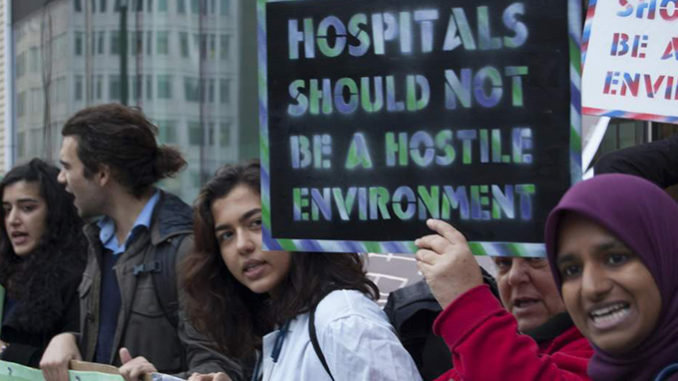
The revelation late last year that the deaths of three mothers in the UK have been linked to the Government’s migrant charges policy places a heavy weight of responsibility on a new inquiry instigated by KONP campaigners in south London, as lives and health of patients are at stake.
A new panel of inquiry has been set up by Lewisham & Greenwich NHS Trust (LGT) to investigate the implementation of ‘overseas charging’ policy at the trust and the trust’s partnership with credit checking company Experian from 2013 to 2019. This inquiry is important and probably the first of its kind. It is a welcome development and a direct result of campaigners from the Save Lewisham Hospital Campaign (branch of Keep Our NHS Public) challenging the trust on why it was responsible for referring a higher number of invoiced to debt collectors than any other trust in England.
Unable to pay
Last March The Guardian reported on NHS patients who had been unable to pay invoices often amounting to thousands or tens of thousands of pounds, and referred to debt collection agencies in England. In LGT’s case, it passes on unpaid invoices to the joint venture company, NHS Shared Business Services (SBS).
Between 2016 and 2018 1,085 unpaid LGT patient invoices worth £5.4m were passed on by SBS to debt firms CCI and LRC. This was the highest in England. And yet only £88,000 was recovered – a mere 2% – a sign many would say that the scheme was more a part of the hostile environment than a rational policy.
Campaigners had also questioned the trust on the link between its partnership with Experian and the high number of patients identified for invoicing. Before they could get an answer, the HSJ disclosed in September that NHS Improvement had suggested to 51 NHS trusts that they might approach Experian, to copy the LGT scheme. This proposal from the regulator to extend data-sharing on an industrial scale was unaccompanied by any legal advice on the lawfulness or ethics of the scheme.
Question over legality
Lewisham & Greenwich Trust was forced into the limelight when a report in a south London newspaper questioned whether LGT’s large-scale data-sharing was ethical or lawful, and quoted MedConfidential’s questions highlighting LGT’s partnership with Experian,.
To be clear, Experian was not doing credit checks on patients. But it was using its database to process large batches of NHS patients’ data in order to confirm who had an ‘economic footprint’.
They relied on that as ‘evidence’ that those with footprints were ordinarily resident in the UK, and assumed to be entitled to NHS care without charge. The trust excluded them from further challenge, and focusing on patients without such a footprint – even though this is in many cases linked to poverty, lack of bank account, credit cards etc. The trust has responded positively following these revelations and has set up the panel of inquiry into ‘Overseas Charging’, headed by an independent chair and with campaigners on the panel. LGT has now told the HSJ they will no longer use Experian. Director of Integrated Care and Development at LGT Jim Lusby argued the trust took the decision to carry out checks on everyone “in order to avoid discrimination,” but has now said“In hindsight it was not the right choice. In all honesty I struggle to defend the logic of this”,
In fact the government’s own MESH database can now offer virtually the same functions as the Experian checks.
Scrap charges
Nationally, the call to scrap the migrant charges scheme is gaining in strength, backed by the Royal College of Midwives, the BMA and the Association of Medical Royal Colleges (AoMRC). Public campaigning will continue outside of the Lewisham panel, which will be looking at how these policies might threaten access to prompt and safe clinical care if patients are fearful of approaching NHS services lest they receive unpayable bills and are referred to the Home Office.
Mothers have even been invoiced following stillbirth or miscarriage. Locally and positively, the trust has changed policy on this. But across the land patients have been scared away from services they need.
The outcome from the Lewisham inquiry could not only lead to safer and more compassionate practice but crucially also add weight to the call to repeal these oppressive laws.
By Tony O’Sullivan,
Co-Chair of Keep Our NHS Public
This article was originally on the LowDown







Leave a Reply